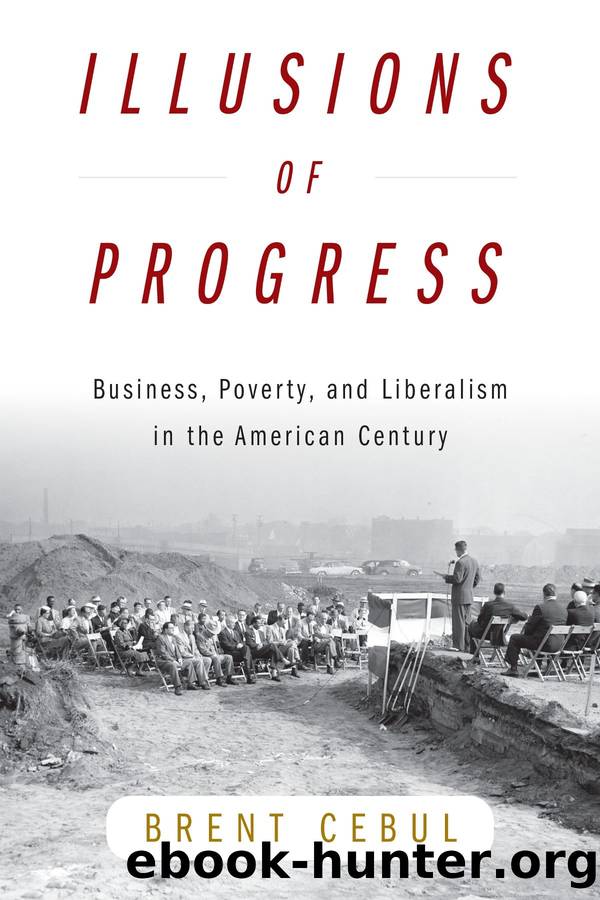Illusions of Progress by Brent Cebul;

Author:Brent Cebul;
Language: eng
Format: epub
ISBN: 9781512823820
Publisher: Lightning Source Inc. (Tier 2)
Published: 2022-10-10T00:00:00+00:00
Humphrey-Hawkins and the Crisis of Federalism
Jimmy Carter began seriously exploring a run for the White House in 1972. That year, he became chairman of the Democratic Governors Campaign Committee, his first position in the national party. Carter did not shrink from controversy or confrontation and, ahead of the 1972 Democratic Convention, joined a bloc of southern and Border South governors at West Virginiaâs Greenbrier Hotel to discuss derailing George McGovernâs candidacy. Carter was especially outspoken, warning that nominating McGovern would risk âdecimating our ranks in the national congress and in state houses.â McGovernâs liberalism was âcompletely unacceptable to the majority of voters in many of our states.â Carter even drew the ire of Georgia state house representative and civil rights icon Julian Bond, who charged Carter with perpetuating Jim Crow politics. Carter accused Bond of making a âracist statement,â noting that Democrats had lost Georgia in 1964 and 1968 because they failed to seek Georgiansâ support.44 He did not specify which Georgians he meant.
At the 1972 Democratic Convention in Miami Beach, Carter claimed the partyâs right flank, continuing to undermine McGovern while simultaneously lobbying to be McGovernâs vice presidential nominee. Speaking before the delegates, Carter argued for the role of the states, rather than the national government, in innovating policy within the federal system. He cited the Appalachian Regional Commission as a signal example of states taking their own initiativeâalbeit with âsubstantialâ âfederal investments.â He also touted Georgiaâs APDCs, in which âthe Federal government played a supporting role, not the primary role.â45 Even as Carter championed those aspects of liberalismâs supply side that could be read as conservativeâthe same aspects Barry Goldwater saluted in Rome in 1961âhe took his place in the long history of southern politicians who did so on behalf of statesâ rights to greater federal assistance. As president, however, Carter would view the federal governmentâs âsupporting roleâ in far narrower terms.
On the campaign trail, Carterâs efforts to bind a fraying Democratic coalition suggested just how untenable a proposition that was becoming. Elites, public officials, and growing ranks of white voters were deeply suspicious of minority administration and quota-based regulations while mobilized minority groups called for targeted, compensatory spending after decades of neglect and violence. To straddle the issue, Carter blended his personal conservatismâhis born-again Christianity and his roots as a small-town businessman turned outsider politicianâwith a technocratic SGPB-style approach to policymaking. Carter emphasized an awkward blend of traditional liberal commitments to boosting employment, the eraâs customary calls to tame inflation, and a pledge to support struggling state and local governments by restoring âa true system of federalism.â46 His personal career with federal aid, marked in equal parts by criticism and dependence, suggested how thorny these dynamics could be. Moreover, Carter struggled to differentiate his vision of intergovernmental reform from Nixon and Fordâs New Federalism precisely because they largely agreed on maintaining local elitesâ administrative authority within decentralized federal programs.
But Carterâs election fundamentally depended upon his ability to court minority voters at a moment of profound and progressive change in the partyâs electorate.
Download
This site does not store any files on its server. We only index and link to content provided by other sites. Please contact the content providers to delete copyright contents if any and email us, we'll remove relevant links or contents immediately.
Bad Blood by John Carreyrou(5780)
Principles: Life and Work by Ray Dalio(5333)
Rich Dad Poor Dad by Robert T. Kiyosaki(5162)
Management Strategies for the Cloud Revolution: How Cloud Computing Is Transforming Business and Why You Can't Afford to Be Left Behind by Charles Babcock(4135)
The Confidence Code by Katty Kay(3575)
Thinking in Bets by Annie Duke(3540)
Playing to Win_ How Strategy Really Works by A.G. Lafley & Roger L. Martin(3018)
American Kingpin by Nick Bilton(2983)
Delivering Happiness by Tony Hsieh(2926)
Project Animal Farm: An Accidental Journey into the Secret World of Farming and the Truth About Our Food by Sonia Faruqi(2667)
Brotopia by Emily Chang(2594)
I Live in the Future & Here's How It Works by Nick Bilton(2531)
Mastering Bitcoin: Programming the Open Blockchain by Andreas M. Antonopoulos(2517)
The Power of Habit by Charles Duhigg(2497)
The Content Trap by Bharat Anand(2496)
The Marketing Plan Handbook: Develop Big-Picture Marketing Plans for Pennies on the Dollar by Robert W. Bly(2420)
The Tyranny of Metrics by Jerry Z. Muller(2406)
Building a StoryBrand by Donald Miller(2368)
Applied Empathy by Michael Ventura(2334)
